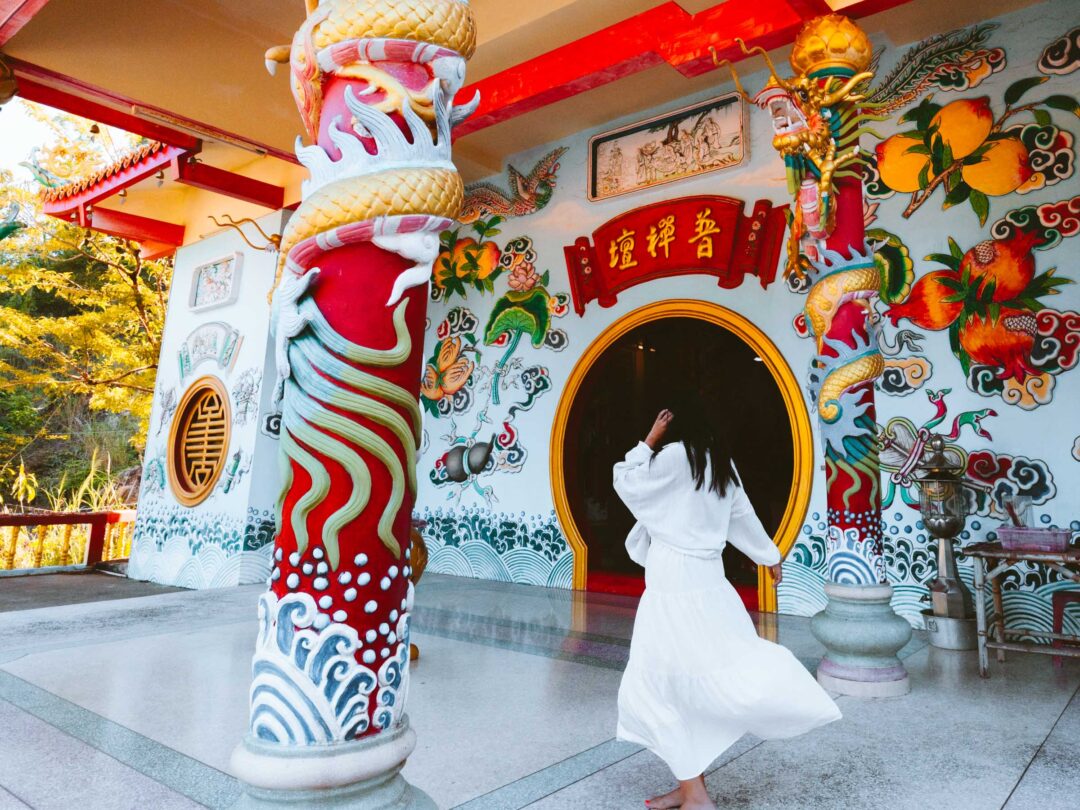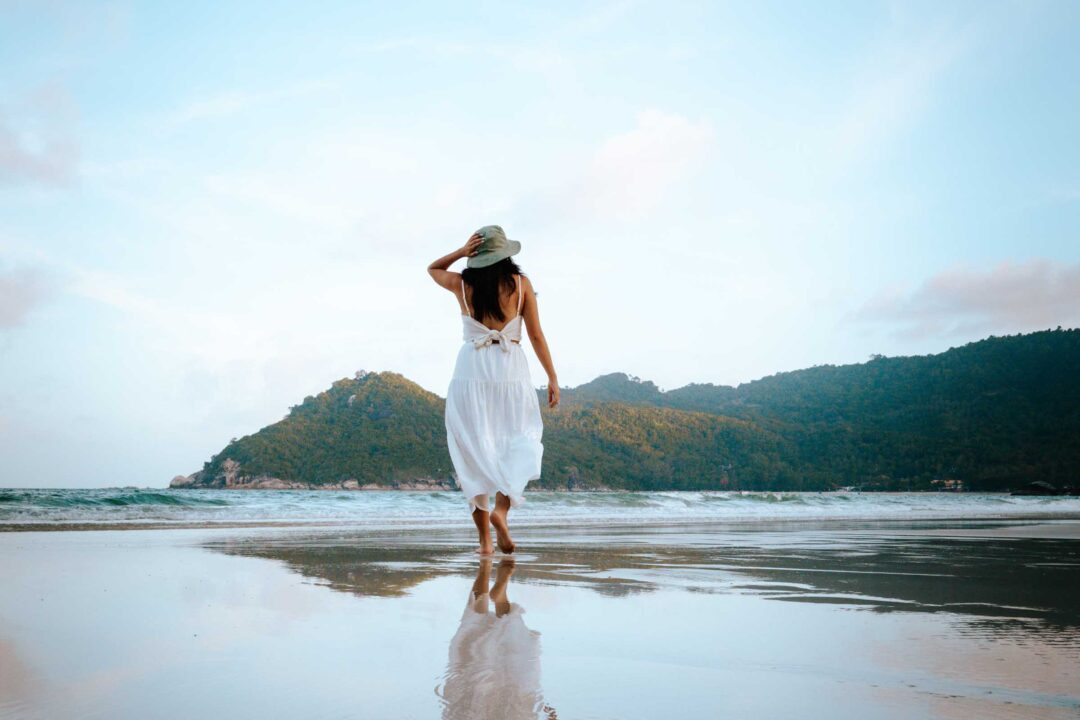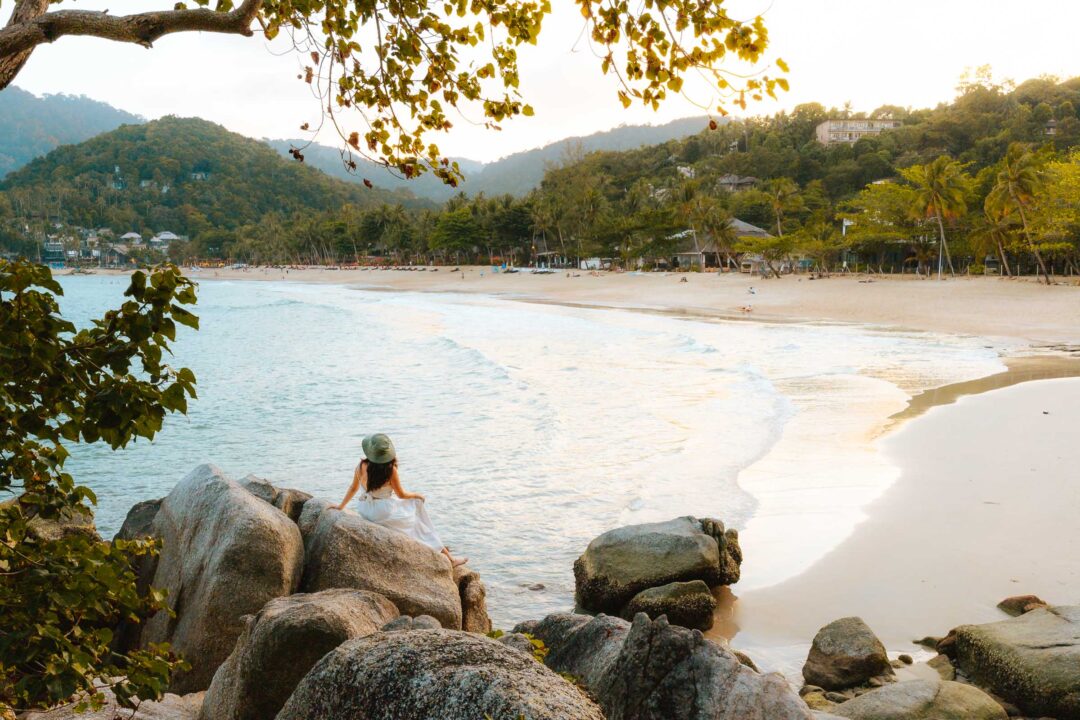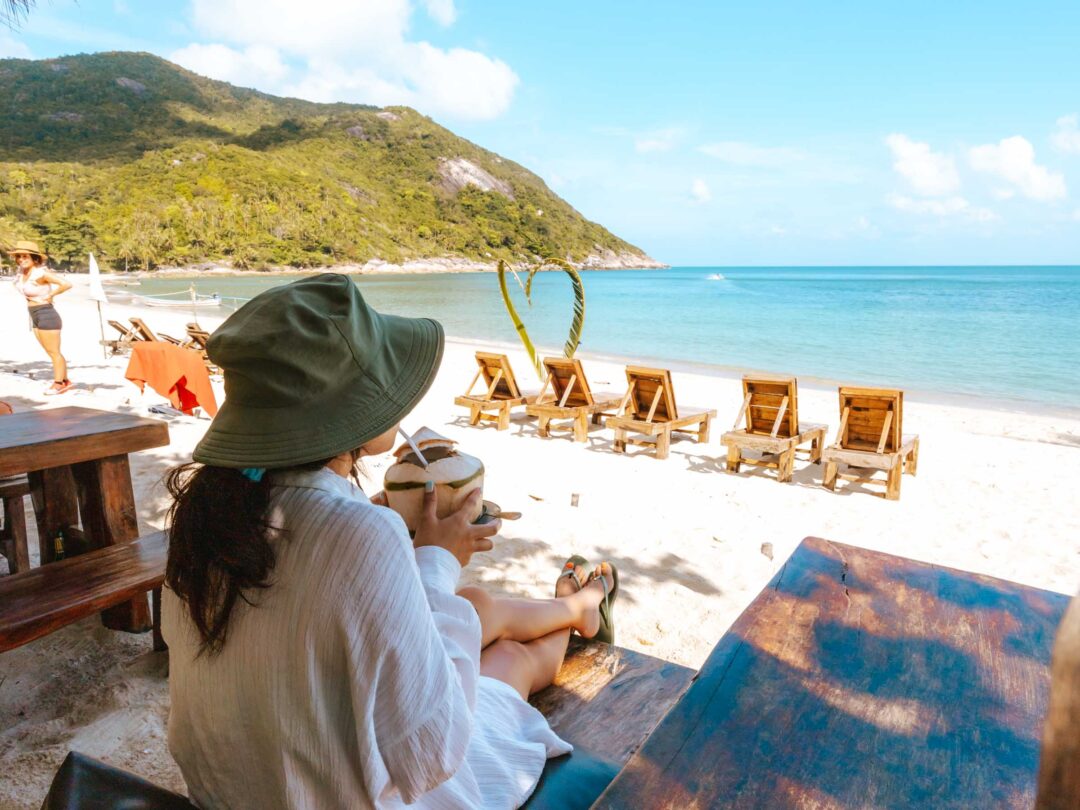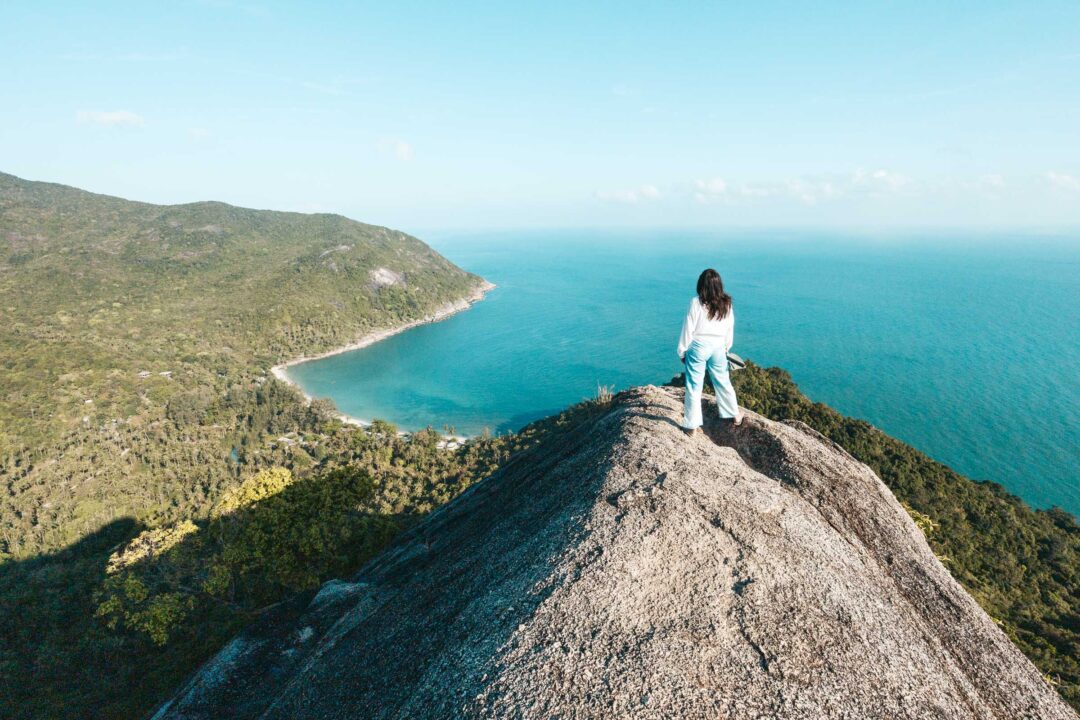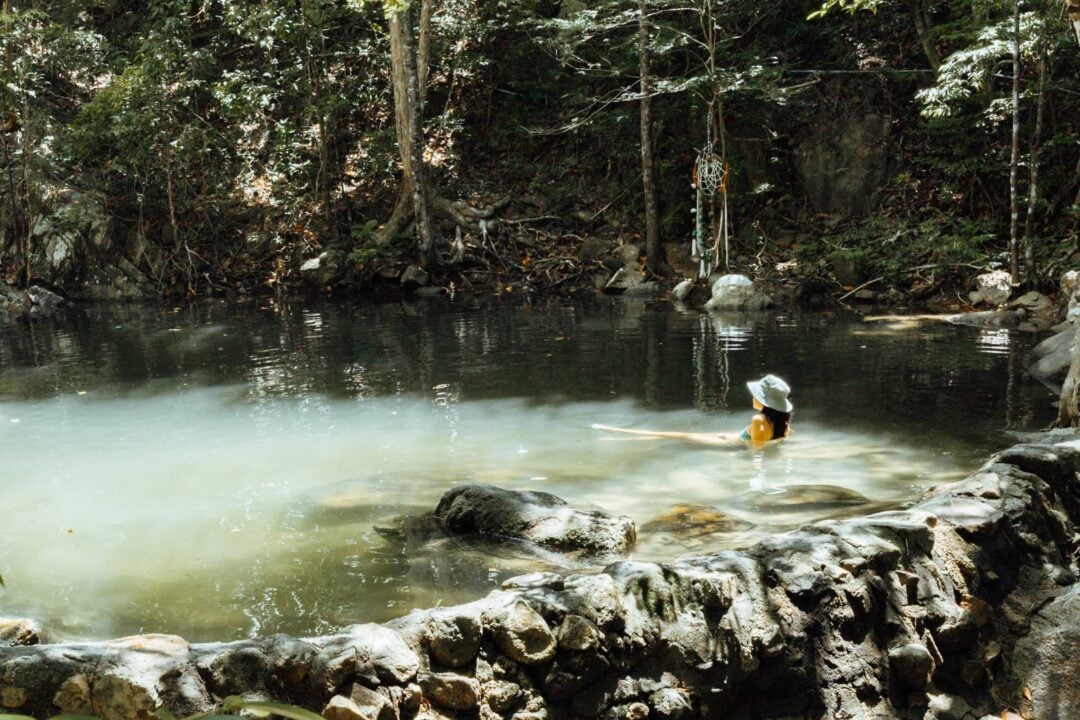After a morning of relocating from Haad Rin to Thong Nai Pan, we decided to make our way to the Kuan Yin Chinese Temple to check out one of Koh Phangan’s most famous places of worship.
Most people come here to see the temple’s Chinese architecture and colorful buildings. We visited the temple in the middle of the day which I’ll be honest we regretted – but I’ll get back to that later on!
The Kuan Yin Temple was our favorite temple in Koh Phangan. The views from the upper areas are gorgeous, and on a clear day, you can see all the way to Koh Tao! I can see why this place has become more popular in recent years.
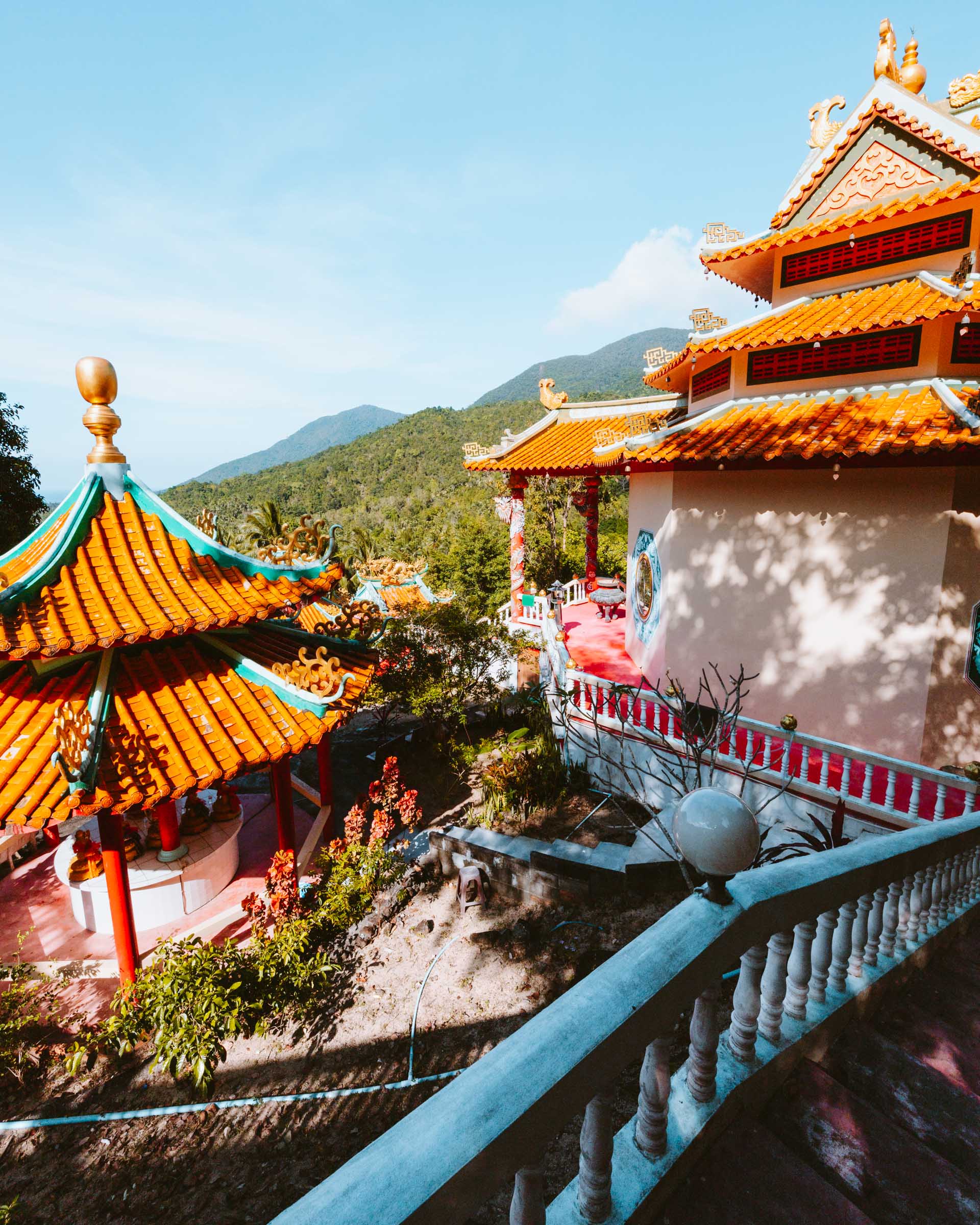
How to get to Kuan Yin Chinese Temple in Koh Phangan
The road to get to Kuan Yin Chinese Temple is steep. It’s also one of the main roads that cuts through the center of the island, so it’s rather wide and fast-moving. You definitely need to be careful if you drive there!
Below is the location of the Kuan Yin Temple. It’s sort of hidden from the roadside so if you’re not paying attention you might drive right by it.
The map marker is accurate and you can use it to navigate to the Kuan Yin Temple. After turning into the road that goes up to the temple, you’ll see a covered parking area on the right side where you can park your motorbike.
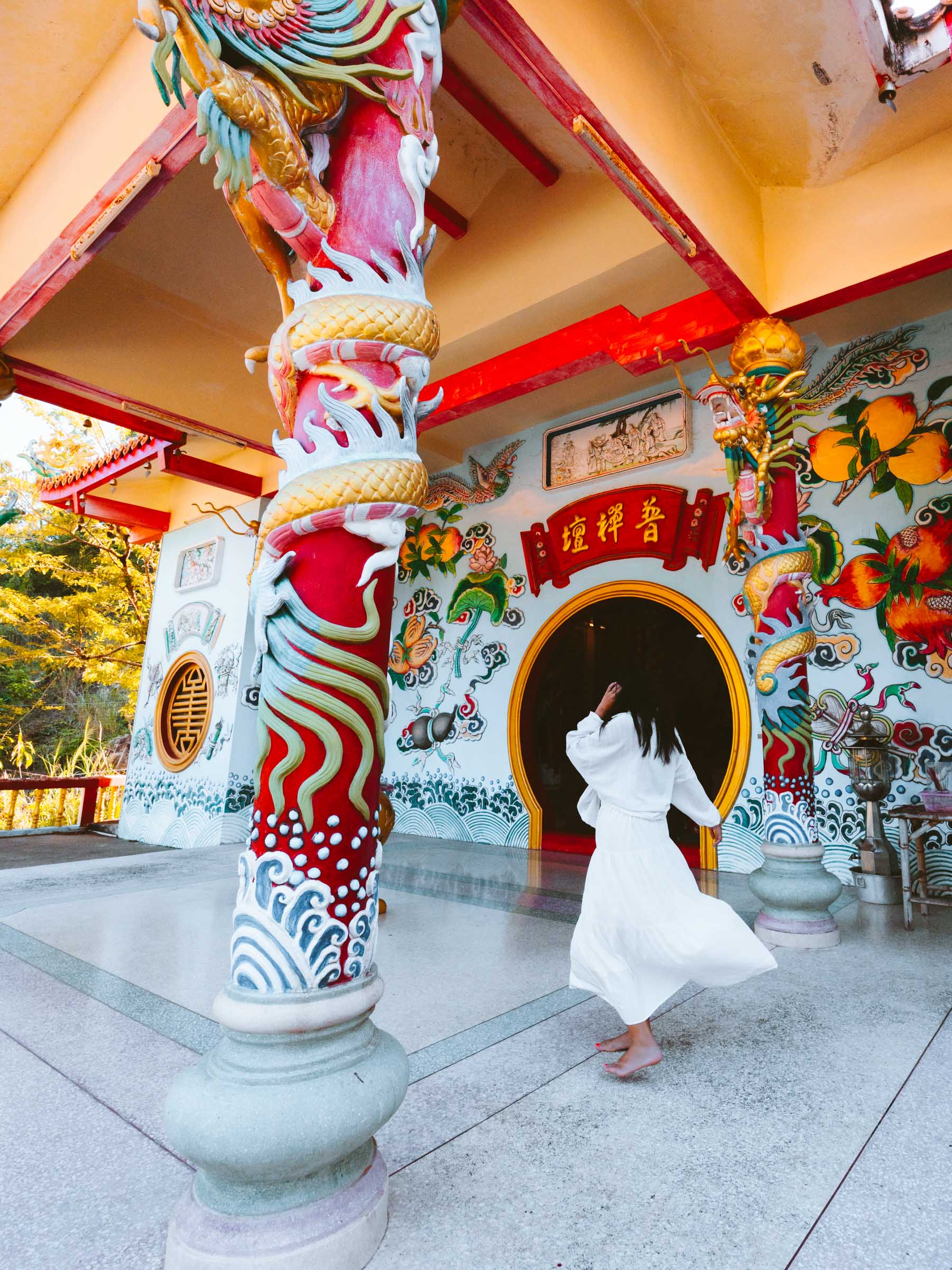
Kuan Yin Chinese Temple: Our Experience
When we arrived at Kuan Yin Temple, we parked our motorbike under the covered area and walked up to the entrance desk. The entry fee was 40 baht per person, so we paid and stepped onto the temple grounds.
Now, onto the temple itself. It sits on a hillside and consists of three main buildings. The central building houses a statue of Guanyin, the Buddhist goddess of mercy. I’ll go into more detail about its history later, but in short, the temple was built in Guanyin’s honor.
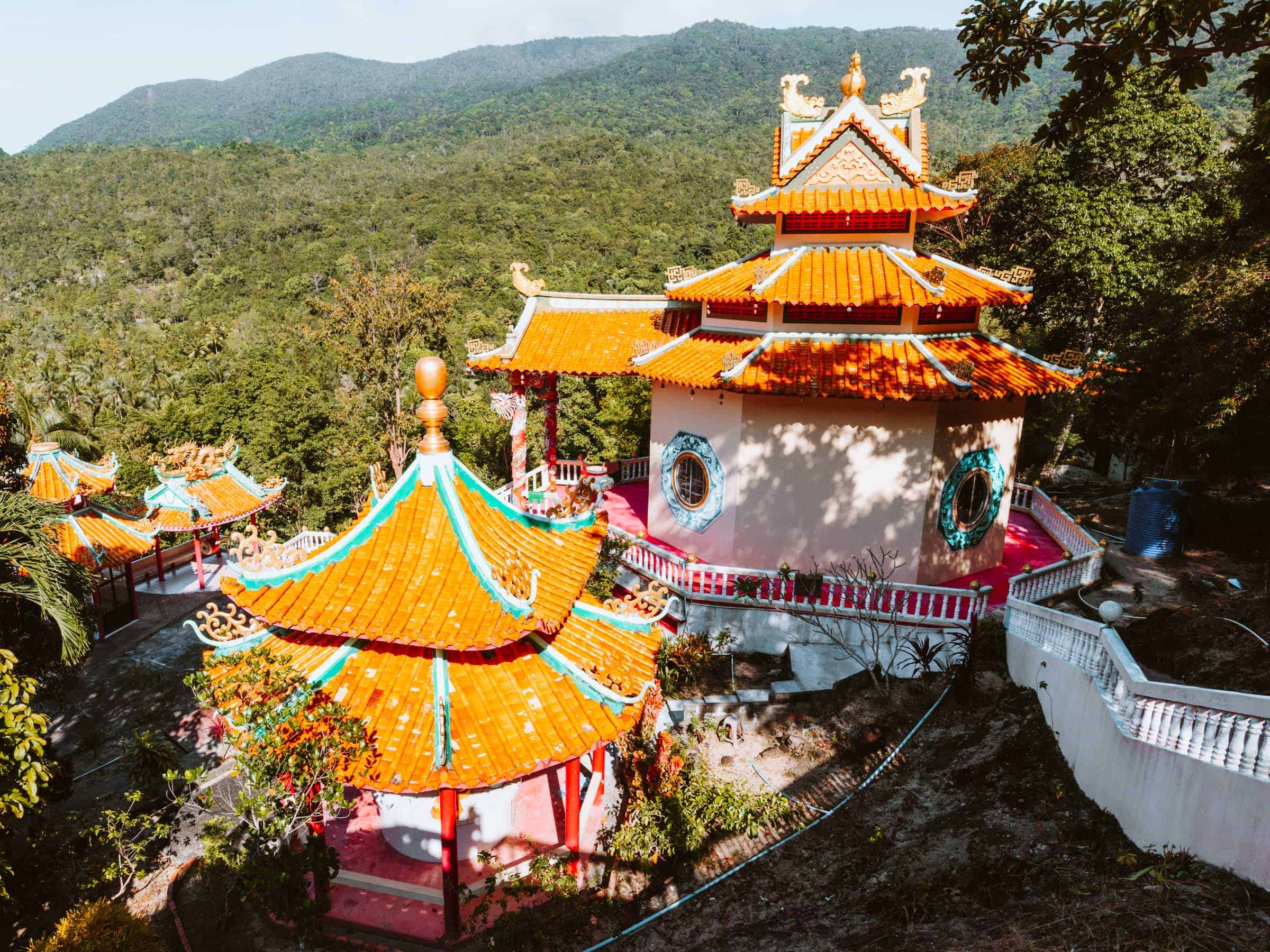
The first thing that caught my attention was the temple’s golden statues and intricate accents.
There’s always something so neat about walking into a Buddhist temple in a tropical place. The vivid colors and shapes always catch me off-guard against the lush green surroundings.

As we explored the temple grounds, we came across the three main buildings that the complex is known for.
The first building we entered seemed to be a shrine dedicated to Buddha. To me, this building was the most elaborate. It had a grand entryway and numerous golden Buddha statues inside.
While taking in the shrine’s intricate details, we also met one of the local temple dogs and took a moment to give them a pet!
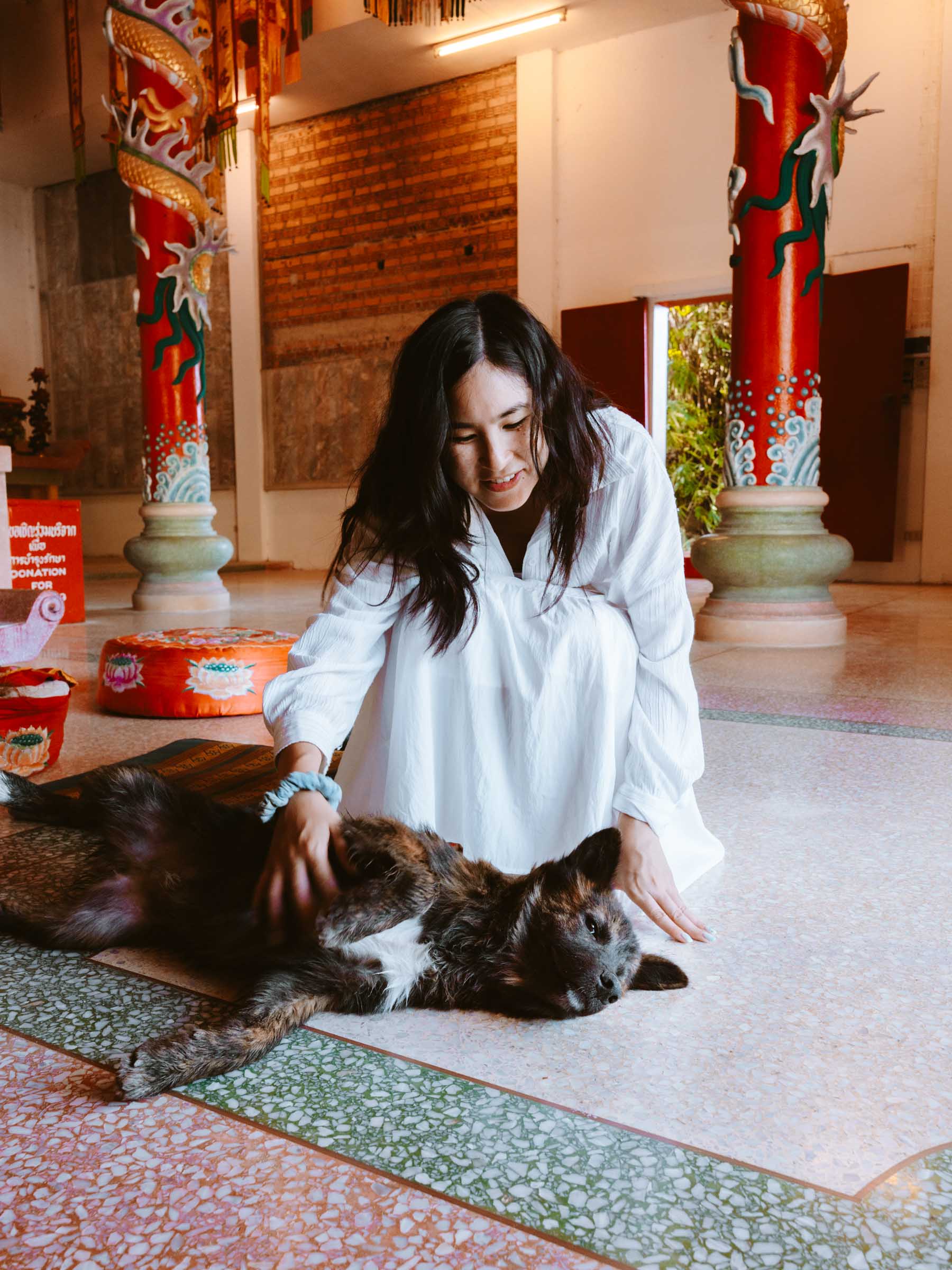
The central building at the heart of the temple complex is a shrine dedicated to Guanyin. A double staircase with a red path and white borders led up to it. It was a clear sign that we were approaching an important place.
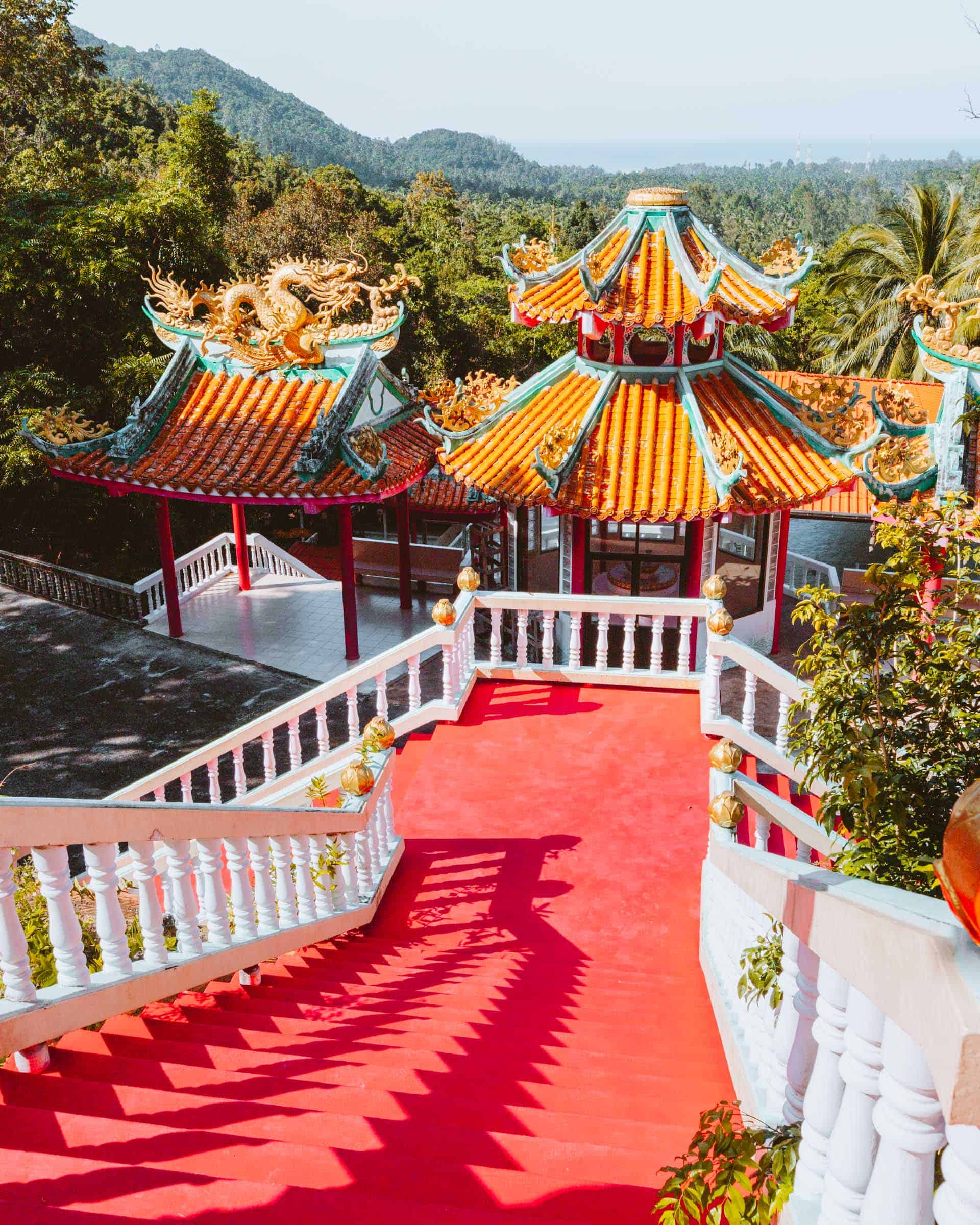
Inside, the presence of Guanyin was immediately apparent due to the feminine statues. Though the shrine itself was modest, it was adorned with necklaces as a sign of devotion.

As we stepped back outside, we were hit by the full force of the midday heat. It was a completely sunny day without a cloud in the sky, so it was time for us to move on. We hopped back on our motorbike and rode toward Thong Nai Pan, off to our next adventure.
Kuan Yin Chinese Temple History
The Kuan Yin Temple has an interesting history.
It all began with a woman named Malawan Trivittayanuruk, who one night had a vivid dream of Bodhisattva Guanyin. In the dream, Guanyin asked her to build a lighthouse on Koh Phangan, to ensure fishermen could safely find their way home.
Malawan shared her dream with a monk and he brought her to Koh Phangan, where she found the exact place from her dream. Her story spread around the island and donations poured in—not just enough for a lighthouse, but far more. With this overwhelming support, Malawan and the monk decided to build an entire temple dedicated to Guanyin herself.
In 1992 the Kuan Yin Temple was completed. Perched on a hill, it features three main buildings, with the central one honoring Guanyin.
Where to Stay in Koh Phangan
Although Koh Phangan is a small island, choosing where to stay isn’t straightforward, especially for first-time visitors. The island has several areas, each offering different experiences.
During our 10 days in Koh Phangan, we stayed in four different areas and covered all sides of the island. This gave us a solid understanding of what each location has to offer in terms of accommodation, atmosphere, and accessibility.
Here’s our take on the different areas to stay in Koh Phangan and what to expect from each one.
- Haad Rin: Home to the infamous Full Moon Party, Haad Rin is the place for nightlife. The entire area revolves around the party scene, with bars, clubs, and hostels catering to those looking to drink and dance until sunrise. If you’re looking for a social, high-energy atmosphere, Haad Rin is the place to be.
- Baan Tai / Thong Sala: Baan Tai and Thong Sala are centrally located to the rest of the island and are the most convenient base if you plan to explore Koh Phangan by motorbike. While Baan Tai and Thong Sala don’t have much in terms of sightseeing, you’ll find plenty of restaurants, markets, and essential services there.
- Thong Nai Pan: If you’re looking for a quiet, upscale retreat with great food, Thong Nai Pan is the best area to stay. It’s a peaceful place ideal for couples and families looking for a relaxing beach vacation. It’s far from the party madness and has calm, scenic beaches and a laid-back vibe.
- West Koh Phangan: The entire west coast of Koh Phangan has a free-spirited vibe. It’s a popular gathering place for expats who live on the island. This is where you’ll find yoga retreats, meditation centers, and vegan cafes, making it the island’s hub for health and wellness. It also happens to have some of the island’s most beautiful beaches.
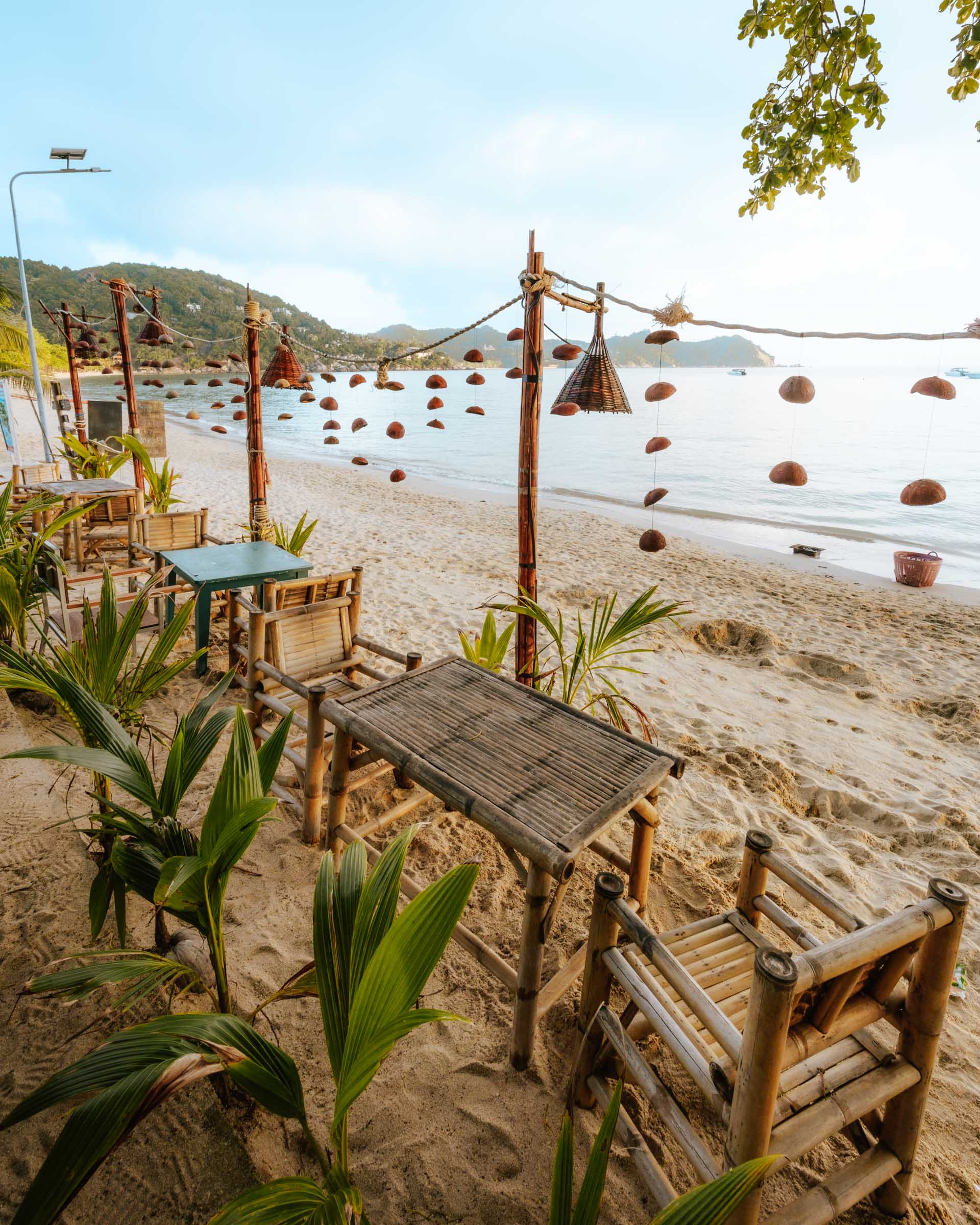
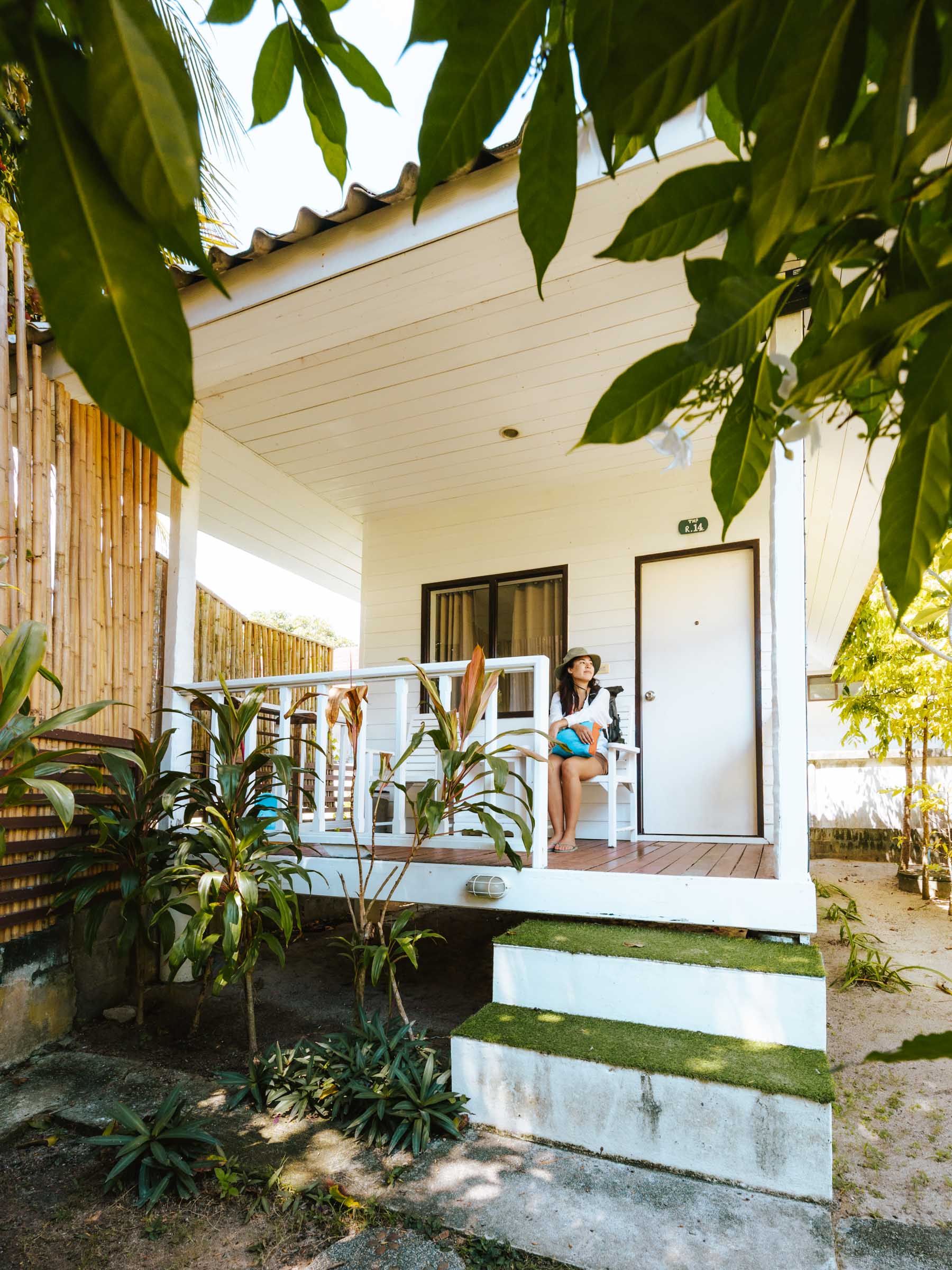
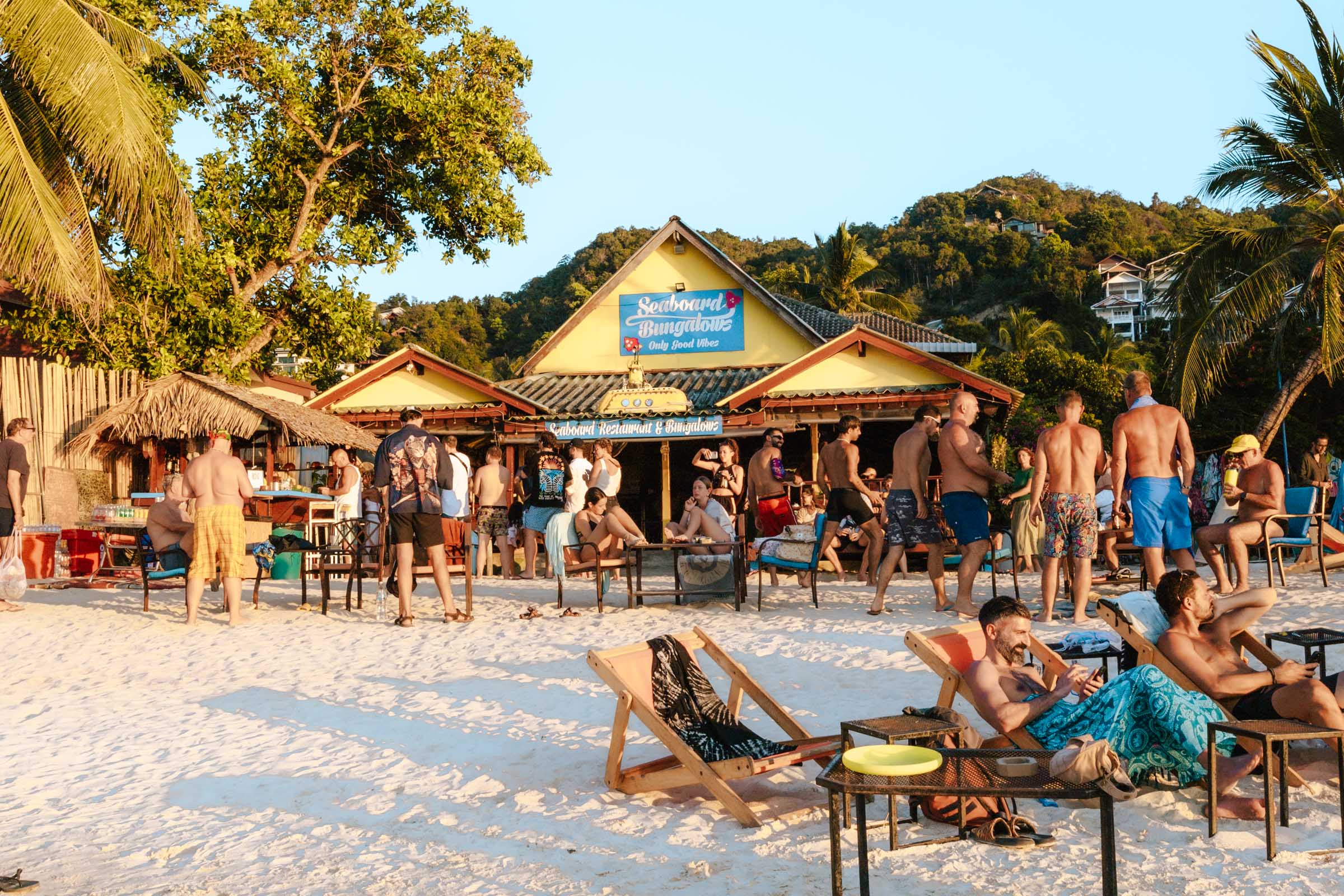
What to Pack for Koh Phangan
Here are some of our must-have items you might not have thought of when packing for a trip to Koh Phangan.
- Crocs: During our time in Koh Phangan, we visited 15 beaches, and almost all of them had one thing in common: rocks in the water! I was so glad to have Crocs to protect my feet when swimming.
- Sunscreen: We ran out of sunscreen while in Koh Phangan, so we went to the store to buy it and it was super expensive! Don’t be like us. Bring plenty of sunscreen because you will need it!
- Dry Bag: With all the sand, salt, and water flying everywhere during our adventures in Koh Phangan, I was so glad to have a dry bag to keep all my things safe from the elements!
- Travel Towel: In my opinion, a travel towel like this one is super necessary for a trip to Koh Phangan! It packs down nicely and was there for me anytime I went swimming, or just needed to brush sand or dirt off.

Our Free Koh Phangan Google Maps Locations
Do you need a handy map with all our Koh Phangan locations? We’ve got a Google Map with all the Koh Phangan locations in this post (plus a LOT more). Sign up in the box below and we’ll deliver it right to your inbox, plus our top tips to help you plan your Koh Phangan adventure.
Are You Following Our Koh Phangan Blog Series?
We spent 10 days in Koh Phangan and found so many things to do there—from waterfalls to beaches, temples, and hikes. To help fellow adventurers, we’ve put together guides to the best places we found. You can check them out by clicking the links below.
- Our Ultimate Guide to Koh Phangan: 16 Incredible Things to Do in Koh Phangan
- Our Koh Phangan accomodation/area guide: Where to Stay in Koh Phangan
- Our Koh Phangan Beach Guide: The 15 Best Beaches in Koh Phangan
- How to plan your trip to Koh Phangan: 3 Days in Koh Phangan: The Perfect Koh Phangan Itinerary
- The Bottle Beach Viewpoint is Koh Phangan’s most epic vantage point
- We did the Haad Rin to Haad Yuan Hike over a mountain to a secluded beach
- Our favorite temple in Koh Phangan is the Kuan Yin Chinese Temple
- Our favorite waterfall in Koh Phangan: Pho Darng Waterfall
- How to get to Koh Phangan: Surat Thani to Koh Phangan by Ferry
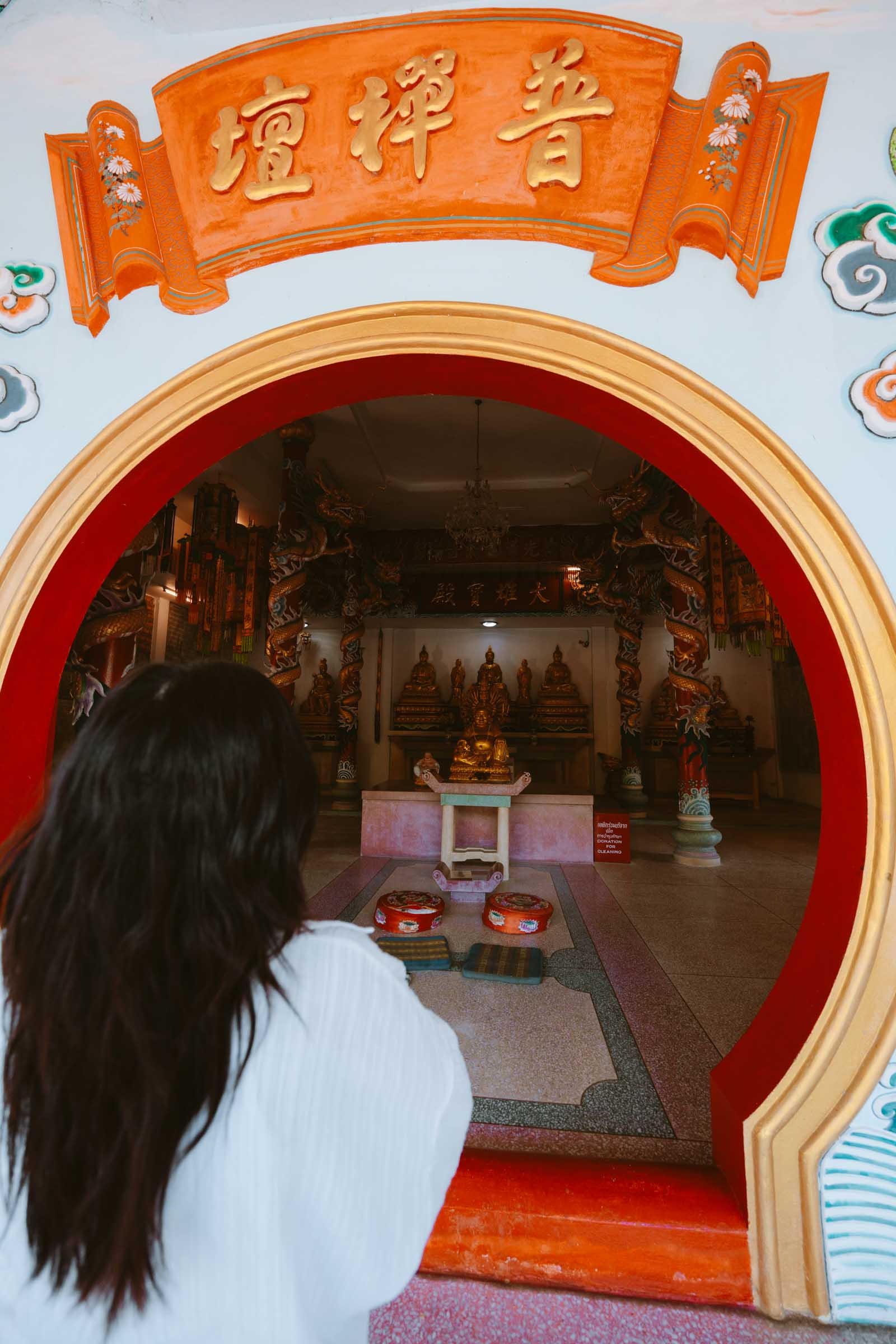
I hope you enjoyed our guide to Kuan Yin Temple in Koh Phangan! Feel free to leave a comment below if you have any questions 🐸

